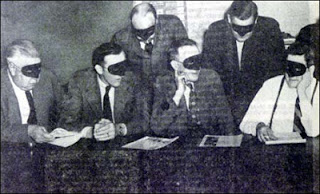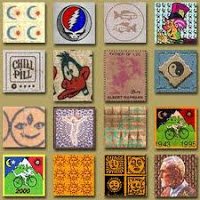Neuroscience

Krebs & Johansen evaluated 'outcome' as the number of alcoholics who showed 'improvement' and so, for each study they calculated an odds-ratio. Overall, the odds-ratio was 1.96, indicating that compared to 'controls', those in the LSD condition were almost twice as likely to show lowered alcohol misuse. Those few studies that followed-up patients showed that any improvement was temporary.
Summary
While this is an intriguing re-analysis of old data, I don't think anyone should be placing any orders on the basis of this meta-analysis. The number of studies is small; given the negative findings for all individual studies, it seems quite likely that further unpublished studies exist (with even more negative results); the analysis appears to contain a potentially influential error; at least one other study contains individuals who would seem unsuitable for analysis; and far more controls were assumed to relapse simply because they dropped out of the study. So, with only 6 studies in the meta-analysis, it would seem prudent to think very carefully before offering LSD as a treatment for alcoholism just yet.
Krebs, T. S. & Johansen, P-O. (2012 in press). Lysergic acid diethylamide (LSD) for alcoholism: meta-analysis of randomized controlled trials Journal of Psychopharmacology
Rerkasem K, & Rothwell PM. (2010) Meta-analysis of small randomized controlled trials in surgery may be unreliable. British Journal of Surgery; 97: 466–469.
Smart RG, Storm T, Baker EF & Solursh L (1966) A controlled study of lysergide in the treatment of alcoholism. 1. The effects on drinking behavior. Q J Stud Alcohol 27: 469–482
- Is Cbt Worthless?
According to a new meta-analysis in Psychological Medicine (Lynch et al., 2009), Cognitive Behavioral Therapy (CBT) is not helpful for those with schizophrenia and bipolar disorder, and any improvements seen in major depression are rather small: Conclusions:...
- Neuropsychology Abstract Of The Day: Modafinil And Fatigue In Depression
Lam JY, Freeman MK, & Gates ME. Modafinil augmentation for residual symptoms of fatigue in patients with a partial response to antidepressants. Annals of Pharmacotherapy. 2007 Jun;41(6):1005-12. Epub 2007 May 22. University of Alabama Health System-Birmingham,...
- Meta-matic: Meta-analyses Of Cbt For Psychosis
Meta analyses are not a 'ready-to-eat' dish that necessarily satisfy our desire for 'knowledge' - they require as much inspection as any primary data paper and indeed, afford closer inspection...as we have access to all of the data....
- Who Watches The Watchmen? Bias In Studying Bias
The coins are often very old by the time they reach the jeweller With his hands and ashes he will try the best he can He knows that he can only shine them Cannot repair the scratches The Jeweller (by Pearls Before Swine) Publication...
- Negativland: What To Do About Negative Findings?
Elephant in the Room (by Banksy) This violent bias of classical procedures [against the null hypothesis] is not an unmitigated disaster. Many null hypotheses tested by classical procedures are scientifically preposterous, not worthy of a moment's...
Neuroscience
Whats Your Poison - LSD vs Alcohol
"A single dose of LSD, in the context of various alcoholism treatment programs, is associated with a decrease in alcohol misuse"
This was the remarkable conclusion from a meta-analysisjust published by Krebs & Johansen (of the Norwegian University of Science and Technology in Trondheim). Their paper forms part of an intriguing renewed interest in using psychedelic drugs as therapeutic agents and is the first attempt to draw some conclusions from the wider literature through the use of meta-analysis.Unsurprisingly, the study has received wide media attention with headlines such as LSD 'helps alcoholics to give up drinking' and claims by some, such as Professor David Nutt that:
"Overall there is a big effect, show me another treatment with results as good; we've missed a trick here…This is probably as good as anything we've got [for treating alcoholism]."
Administering LSD to alcoholics was quite popular during the late 50s until the early 70s -as partly evidenced by Krebs & Johansen locating over 4000 relevant articles in their litearture trawl. At one point, Alcoholics Anonymous founder - William Griffith Wilson - advocated dispensing LSD at AA meetings (prior to changes in LSD legality).

The Watchmen or just early members of an AA group?
So, what did Krebs & Johansen do in their analysis? After screening their 4000+ records, they whittled their meta-analysis down to just 6 randomised controlled trials.
- the 6 LSD groups consisted of 325 individuals who received single oral doses of LSD ranging from approx 210 mcg (3 mcg/kg) to 800 mcg, with a median dose of 500 mcg
- the 6 'Control' groups consisted of 211 indviduals receiving low-dose LSD (25 mcg or 50 mcg), d-amphetamine (60 mg), ephedrine sulphate (60 mg), or non-drug control conditions (TAU or sit and write for 3 hours)
Krebs & Johansen evaluated 'outcome' as the number of alcoholics who showed 'improvement' and so, for each study they calculated an odds-ratio. Overall, the odds-ratio was 1.96, indicating that compared to 'controls', those in the LSD condition were almost twice as likely to show lowered alcohol misuse. Those few studies that followed-up patients showed that any improvement was temporary.
Given the potentially huge ramifications of their conclusions, it is worth considering the Krebs & Johansen paper in more detail - so here are a few reasons why we may want to reign in the rhetoric:
- None the 6 studies in the meta-analysis actually documented a significant impact of LSD on alcohol misuse. Pooling data from the 6 studies, however, revealed a highly significant effect (p=.0003). As the authors note, a lack of significant effects for individual studies may reflect the use of small samples and their lack of power to detect differences. Despite this, 2 of the 6 studies with seemingly quite large samples (Ludwig n=176, Pahnke n=117) still reported nonsignificant effects of LSD on alcohol misuse. The lack of effects for individual studies may well explain precisely why the practice of LSD as a therapy for alcoholism was terminated – i.e because it did not produce any noticeable effect in a single study!
- The question now is whether a large-scale trial is warranted (to overcome the assumed low power of past studies)? Meta-analyses can produce significant effects despite most or even all individual studies being nonsignificant; and several high profile cases have appeared in other treatment literatures (e.g. streptokinase: Lau et al 1992). Crucially, when those treatments have subsequently been evaluated in definitive large trials, they have failed to reach significance. Egger and colleagues have written extensively on the unreliability of conclusions in meta-analyses where small numbers of nonsignificant trials are pooled to produce significant effects (Egger & Davey Smith. 1995) for a recent example, see Rerkasem K, Rothwell PM (2010).
- When examining small numbers of randomised control trials with marginal effects, one particular issue is publication bias. Given the lack of significant effects in these 6 published trials, it seems feasible that other nonsignificant studies never even reached the publication stage (but languish in file drawers of researchers). Consistent with this notion, we would expect small trials to produce greater variability in the outcomes with some reporting large effects and others reporting small (negative) effects – this does not appear to be the case here – the studies were strikingly homogeneous. Unfortunately bias was not addressed in the paper
- As the 6 studies themselves date back to 1966-1970, it has not been possible to track-down all of the original papers. Nonetheless, I draw attention to one study in the analysis (Smart et al 1966). Although Krebs & Johansen claim they excluded serious mental health problems with "contraindication for treatment with LSD" such as schizophrenia, the Smart et al study tests alcoholics with schizophrenia, organic brain syndrome, epilepsy, OCD and borderline IQ. It is difficult to know what to make of analyses of the effects of LSD in such groups and it would be useful to know if the groups in the remaining studies had similar compositions.
- Crucially, I note an important data error in the meta-analysis. For the Ludwig et al (1969) study, Krebs & Johansen report an OR of 1.88; however, this does not correspond to the data of 88/132 and 31/44 reported (see their Figure above). This is a particular concern not just because there are only 6 studies, but because the Ludwig study contains the largest weighting in the whole meta-analysis!
- Two studies (Hollister et al., 1969; Tomsovic and Edwards, 1970) had poor retention rates specifcially for the controls - with retention rates of 64% and 73% for controls vs. 81% and 92% for LSD. Crucially, these two studies produced the largest Odds-Ratios in favour of LSD (OR =2.27 and 2.25 respectively). Referring to these studies, Krebs & Johansen state that the "...authors of both of these trials expressed that missing participants had probably relapsed to problem alcohol use, consistent with the strategy of considering missing participants as unimproved." In other words, Krebs & Johansen assumed that drop-outs reflected 'alcohol misuse'; and since drops outs were high for controls in these two studies, we have the largest effects!

Summary
While this is an intriguing re-analysis of old data, I don't think anyone should be placing any orders on the basis of this meta-analysis. The number of studies is small; given the negative findings for all individual studies, it seems quite likely that further unpublished studies exist (with even more negative results); the analysis appears to contain a potentially influential error; at least one other study contains individuals who would seem unsuitable for analysis; and far more controls were assumed to relapse simply because they dropped out of the study. So, with only 6 studies in the meta-analysis, it would seem prudent to think very carefully before offering LSD as a treatment for alcoholism just yet.
References
Egger & Davey Smith. (1995) Misleading meta-analysis. Lessons from “an effective, safe, simple” intervention that wasn't. British Medical Journal;310:7524Krebs, T. S. & Johansen, P-O. (2012 in press). Lysergic acid diethylamide (LSD) for alcoholism: meta-analysis of randomized controlled trials Journal of Psychopharmacology
Rerkasem K, & Rothwell PM. (2010) Meta-analysis of small randomized controlled trials in surgery may be unreliable. British Journal of Surgery; 97: 466–469.
Smart RG, Storm T, Baker EF & Solursh L (1966) A controlled study of lysergide in the treatment of alcoholism. 1. The effects on drinking behavior. Q J Stud Alcohol 27: 469–482
- Is Cbt Worthless?
According to a new meta-analysis in Psychological Medicine (Lynch et al., 2009), Cognitive Behavioral Therapy (CBT) is not helpful for those with schizophrenia and bipolar disorder, and any improvements seen in major depression are rather small: Conclusions:...
- Neuropsychology Abstract Of The Day: Modafinil And Fatigue In Depression
Lam JY, Freeman MK, & Gates ME. Modafinil augmentation for residual symptoms of fatigue in patients with a partial response to antidepressants. Annals of Pharmacotherapy. 2007 Jun;41(6):1005-12. Epub 2007 May 22. University of Alabama Health System-Birmingham,...
- Meta-matic: Meta-analyses Of Cbt For Psychosis
Meta analyses are not a 'ready-to-eat' dish that necessarily satisfy our desire for 'knowledge' - they require as much inspection as any primary data paper and indeed, afford closer inspection...as we have access to all of the data....
- Who Watches The Watchmen? Bias In Studying Bias
The coins are often very old by the time they reach the jeweller With his hands and ashes he will try the best he can He knows that he can only shine them Cannot repair the scratches The Jeweller (by Pearls Before Swine) Publication...
- Negativland: What To Do About Negative Findings?
Elephant in the Room (by Banksy) This violent bias of classical procedures [against the null hypothesis] is not an unmitigated disaster. Many null hypotheses tested by classical procedures are scientifically preposterous, not worthy of a moment's...

